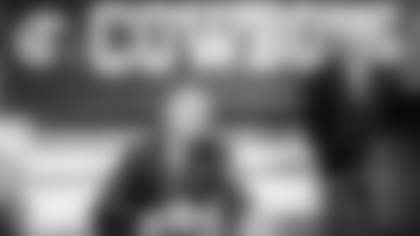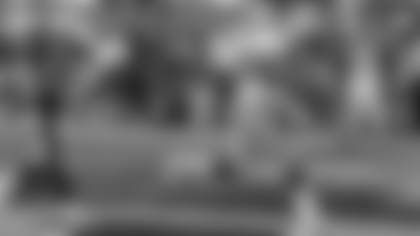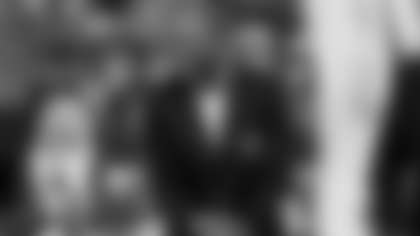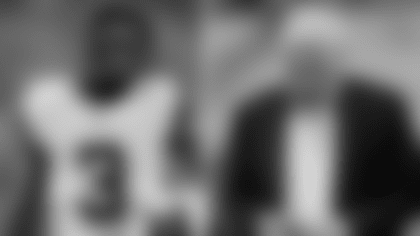Jerry Jones doesn't like to waste time. He has never been much of a sleeper, three or four hours most nights, and there have been stretches when he's especially stressed that an hour was considered his best Rip Van Winkle impersonation.
The last time Jones played golf – a lifetime ago, his kids didn't even know he had ever played – he closed a business deal on the first green, shook hands and promptly walked off the course, leaving his clubs in the cart.
"Why would I play for another four hours when the deal was done?" Jones says.
There are legions of stories about 4 a.m. phone calls, the person on the other end of the line not entirely sure if Jones was just waking up or hadn't gone to sleep yet. When he started doing an hour on the elliptical every morning in his 50s, he would have a list of phone calls to make while doing so. It didn't matter that it was six in the morning.
But at 46 years young in 1988, Jerry Jones, the man who doesn't want to waste a single second of the day, was ready to take a few steps back, do some traveling, enjoy his family, and who knows, maybe even take up golf again.
Whether this ever had a chance of becoming reality, whether he could have shut down that brilliant mind of his from working 22 hours a day, that's a debate for another time. The fact is, that was the plan after he and Mike McCoy sold their gas and oil company, Arkoma, for $175 million and Jerry Jr. started his freshman year at Georgetown University.
"My parents were going to be empty-nesters and enjoy travel. They had big plans," Jerry Jones Jr. says. "I wouldn't say he would have retired by any stretch; he would have found something to create. My dad always has to have a challenge, and really, he can't sit still. He's so competitive. I do think my mom was hoping he was going to relax, become a little more laid back."
In terms of the ultimate dream, well, the NFL kept moving the goal posts on Jones, the price tag of admission only kept growing, more so than Jerry's bank account, at least until 1988.
Four years earlier, he, like the rest of the world, didn't even know the Cowboys were for sale.
"I read about it after the fact, and did a little research and found out it was a pretty private transaction. They had borrowed huge amounts of money from Mr. [Harvey 'Bum'] Bright's banks," Jones says. "At that point, I really only wanted to buy the Cowboys, so I thought that dream was done. I should point out, at the time, I couldn't have financially done it anyhow."
That wasn't the case in the fall of 1988 when word came the Cowboys were once again on the block. His finances, mostly through the sale of Arkoma, had changed dramatically. Thing is, just a few weeks earlier, Jones had told his accountant, Jack Dixon, that he had no plans of ever touching the money, that all the stress of the previous 25 years was behind him. There would be no more risk-taking. He and his family were set, for generations really. It was time to relax.
Still, this was the Cowboys. If there was a singular belief of the Jones family, one which was instilled in Jerry more so than any other, it was this: There is no dream too big. And there is no restriction on accomplishing those dreams. By instinct, they were also risk-takers. To win big, you have to play the big hand.

"Jerry called me in October, said he was thinking of buying the Cowboys and let's take a look at the books. So we contacted Solomon Brothers, who was handling the sale, and we went down to Dallas for a week," Dixon says. "Then we went down a second time, Stephen came along, and we interviewed [longtime Cowboys president/general manager] Tex Schramm and a few of the financial folks with the team. The asking price at the time was $200 million.
"After a month of researching it all, I told Jerry point-blank this was ridiculously overpriced and buying the Cowboys would be financial suicide. He could have gone dead-dog broke on this."
There was no contact for six weeks or so, and then after the Cowboys finished the season at 3-13, Bright reached out and dropped the asking price to $140 million – $65 million for the team and $75 million for Texas Stadium. The deal came together pretty quickly after that and on Feb. 23, 1989, Dixon and Jones finalized the numbers with Bright in Dallas. Jerry was contributing $90 million in cash, almost every dime he had, and borrowing the rest, putting up everything he owned as collateral. He was all-in.
"The Cowboys were absolutely financially in the roughest shape there was, the proud America's Team had been foreclosed on," Jones says. "Part of the team had been auctioned and bought by the government. Just think about that a minute.
"You hear folks say, 'Jerry is all about the money.' Hell, I've spent money as fast as anyone who has ever lived. The money, I don't get a kick out of thinking about my bank accounts or like Scrooge looking at his stacks of money. I didn't do this for that. That's not what my career has been about. I did it to have the stuff that money gets. So my dream was both. I wanted to be in football, but I wanted to collect the resources that I could."
After signing the papers, Jones and Dixon headed to a local bar for a drink. As they stood there, the bar jam-packed with people, Dixon said, "You realize that this is the last time you're ever going to be able to walk in a bar and no one knows you. You are going to be famous. Everyone is going to know your face, want your autograph, want to take a picture."
Jones laughed, and said, "Nah, owners aren't that well known."
Within days, never mind in the coming weeks, months and years, Jones would become one of the most recognizable men in sports.
As for the franchise he had just purchased, well, it was like Dixon advised him, a financial disaster, losing just shy of one million dollars a month. Honestly, that wasn't even the bad news. One advisor told Jones that he would likely be losing $25 million a year by 1992.
"Everyone forgets what was going on in 1989. It was a major financial meltdown, savings and loans banks were going under, oil and gas was at an all-time low, and to finance the loans to buy the team, Jerry was paying an 11.5 percent interest rate, or $40,000 a day," Dixon says. "Every NFL team was losing money, but here's the thing. For years, it was a rich man's club, the league wasn't set up to make money. It was about really rich men who liked having a football team and could afford to lose a few million each year.
"That was Jerry's greatest challenge. He had to generate revenue, pay debt, and change the thought process among his fellow owners. Jerry wanted to win as much as anyone, but he was going to run the Cowboys as a business. He was going to make them profitable."
About a month after the purchase went public, Jerry received a phone call from his father, Pat, who wore many hats for his son: best friend, business mentor, and really, his conscious. He said, "I don't know if you ever want to do anything else with your life. You may not. But if you do, you'll never get the opportunity if you don't make the Cowboys work. This thing is too visible. You have to make it work or you're going to be recognized as a failure."

The pressure was seemingly insurmountable. Oh, and overnight Jones became the most hated man in Dallas, if not the sports world. He fired Tom Landry, God's coach, a beloved figure, and held an admittedly bizarre, off-the-cuff press conference for which he wasn't prepared in the least.
"I really couldn't have handled all that much worse and the really sad part of it is I idolized Tom Landry and everything he stood for. It was because of him and what he accomplished and the way he accomplished it that I wanted to buy the Cowboys," Jones says. "I offered him a front-office position, told him he could name the position. He wasn't interested, which I totally understood. I didn't want to fire him. I just wanted Jimmy Johnson as my head coach."
"The toughest moment we've had through these years of owning the Cowboys is the Tom Landry situation," says Stephen Jones. "Jerry does have a huge heart and he wanted to do things the right way. Bum Bright offered to do that for Jerry, and in hindsight, he should've let him before he ever bought the team. But Jerry wanted to go see Tom and do it in a classy way, and unfortunately, it backfired on him.
"I think a lot of people had this view of Jerry being a guy that's coldblooded and didn't respect Tom, and it was just the opposite. That was the hardest thing for me, just that we got off to such a tough start because of the Tom Landry situation."
There were death threats, both by mail and over the phone. There were many nights Jones slept in his office at Valley Ranch. He was sleeping an hour here and there, and was soon diagnosed with sleep arrhythmia. There were also heart problems. Jerry has always been a caffeine junkie, but during those first few years owning the Cowboys, it was coffee all morning and iced tea all afternoon.
One night, he finally ventured out with his wife, Gene, for dinner, and sure enough, an older woman kicked him in the shin and said that was for Tom Landry.
There was another factor in play, that being that a lot of Dallas types weren't thrilled with someone from Arkansas buying their football team. Really, almost immediately Jerry became Public Enemy No. 1 everywhere except for in his home state.
"Those were really hard times, and we had never experienced that. Jerry was always well liked by everyone," Gene says. "There had never been anyone on the sidelines second-guessing his personal and business decisions in the past. It was life changing. At times it was exciting, but the difficultly and stress was outweighing that more times than not.
"Even after all those years of being together, Jerry boggled my mind through that stretch. He somehow moved past it all and stayed positive. At the same time, he's so human in that he wants to be liked. He's not happy unless he's pleasing everyone. It was a shame so many people didn't see, or understand, that side of him."
Despite the almost constant negative press, despite people shouting insults and cursing at him in public, really on a daily basis, Jones and Johnson went to work, one on the business end, the other football. During those first nine months as the Cowboys owner, Jones was flying around the country so much that his plane's fuel bill averaged $50,000 a month. At one point, he hit all four corners of the U.S. in less than 24 hours.

Among the first orders of business, after significantly downsizing the team's employee count, was working out a contract agreement with Troy Aikman before they selected him with the No. 1 overall pick. Eventually, just a few days before the 1989 NFL Draft, a deal was reached, the largest for a rookie in league history: six years, $11.2 million. The signing bonus cancelled check is framed to this day on the wall of Jerry's study at his home.
Representing Aikman in the negotiations was super-agent Leigh Steinberg, who the movie character of Jerry Maguire was later based.
"Our first meeting was at Valley Ranch and there was no food except microwave popcorn, so we eventually leave for one of the airport hotels," Steinberg says. "At first there were six of us, including Jimmy and Stephen, but everyone was falling sleep. Jimmy right there at the table. Everyone else went up to a room. At 5 a.m., Jerry and I are still talking.
"Thing is, it wasn't about the Aikman contract. We were talking about the future of the league. This guy was so far beyond what anyone else was thinking at the time. He was talking about branding, TV contracts, independent deals of the NFL, naming rights for stadiums, sponsorships. All this is old hat now, but no one was talking about it in 1989. That night was the first time anyone ever mentioned the internet to me. Jerry was explaining to me how he was going to use this internet to grow the brand of the Dallas Cowboys.
"That was one of the most exciting nights of my career. It was the first time I heard an owner talk about where the league was going. Jerry got it, he saw what the league could be financially. I've never met anyone who could envision the future like Jerry can. He was on his way to reshaping the NFL."







